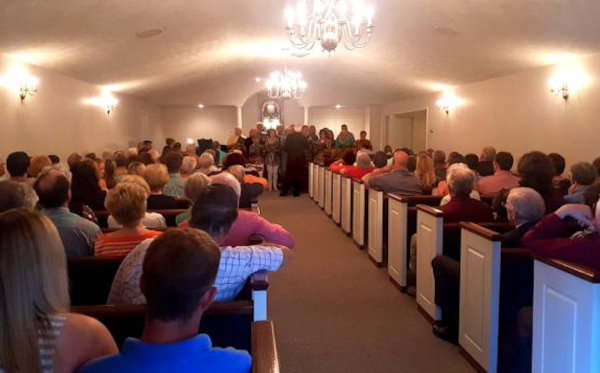A break-away congregation in Louisville, Mississippi heads to court over their building.
HEATHER HAHN
United Methodist News Service
Mississippi Conference leaders have decided the church property used by a breakaway congregation should remain in United Methodist hands.
Under the leadership of its pastor, the congregation now is suing to keep the building.
On March 25, 175 members of First United Methodist Church in Louisville voted to withdraw from the denomination, six voted to remain and one was undecided. That same day, 22 members at nearby Bevil Hill United Methodist Church also voted to leave. The churches in Winston County are about 95 miles (153 kilometers) northeast of Jackson.
The Rev. Mike Childs, pastor of both congregations for 13 years, expressed growing dissatisfaction with other conferences’ lack of enforcement of church laws against the practice of homosexuality.
Nearly two months later, Bishop James E. Swanson Sr. announced that First United Methodist Church in Louisville would remain part of the denomination and that he had appointed the Rev. Carl Grubbs as interim pastor. Grubbs also previously was the church’s pastor.
“First United Methodist Church of Louisville is a county seat church with more than 150 years of history,” the bishop’s May 23 announcement said. “After exploring the potential viability for ministry, the leadership of the Mississippi Annual Conference deemed that it is vitally important to sustain a strong United Methodist presence in Louisville and Winston County.”
The conference also determined that Bevil Hill is now closed.
That same day, Childs — a United Methodist pastor for 43 years — surrendered his clergy credentials. The conference also gave him 30 days to vacate the parsonage, he said.
The Mississippi Conference can claim the property used by congregations under the trust clause of the Book of Discipline, the denomination’s policy book. The clause, which dates to 1797, states that local church properties are held “in trust” for the denomination, even if the congregation’s name is on the title.
However, Childs argues that under Mississippi law, the property should belong to the congregation that now identifies as First Methodist Church of Louisville.
When Swanson asked for a church meeting on May 23, Childs said he and other church members expected the bishop was coming to negotiate a settlement for the property.
“I did tell him this: Bishop, we will not do anything unethical. We will not do anything illegal. But we will fight you with every legal means possible,” Childs said. “He just sort of chuckled and said, ‘I was pretty sure of that.’”
On May 27, First Methodist held worship at the chapel of Porter Funeral Home. Childs said more than 250 people attended, more than could fit in the funeral home’s pews.
Meanwhile, he said, a small delegation from his congregation went to worship at First United Methodist Church where Grubbs preached.
“We contend it’s our building so we sent a group up there to welcome them,” Childs said. From that group, Childs heard that more than 30 people were at worship. Grubbs did not respond to requests for comment, and Swanson did not expand on his communications to the conference.
Lawyers for First Methodist and the Mississippi Conference have agreed, with a judge’s approval, that the two congregations will share the building on Sunday, June 3. Grubbs will lead worship at 9:30 a.m., and Childs at 11 a.m.
Winston County Chancery Court has scheduled the case’s first hearing on June 6. Childs said his congregation is seeking to continue its hold on the building at least until litigation is completed.
The conference’s decision to hold onto the building in Louisville marks a change from how it handled last year’s departures of two large congregations — The Orchard in Tupelo and Getwell Road in Southaven.
Under settlements reached with the Mississippi Conference last year, both The Orchard and Getwell Road congregations left with their property in exchange for each paying a full year’s apportionments — the giving requested to support conference and district ministries.
According to the 2017 Mississippi Conference journal, The Orchard had incurred $4.5 million in property debt and Getwell Road $3.7 million in property debt. In both cases, appraisals put the sales value of the property at significantly lower than the debt.
The situation with the Louisville church building is different. The church, whose sanctuary dates to 1917, has about $1 million in debt from recent renovations, Childs said.
The Rev. Vickie White, conference director of connectional ministries and communications, confirmed that debt but added that it can be paid off over 20 years.
She said conference leaders prayerfully discern the viability of ministry at locations based on Paragraph 213 of the Book of Discipline. That paragraph outlines a process for assessing local church potential, including looking at such matters as fiscal and facility needs.
Swanson, in a statement to the Mississippi Conference, asked for “your continued support of First United Methodist Church in Louisville as we work through this process.”
Childs said the community of Louisville has rallied behind him and his congregation. Six churches in town have offered the congregation use of their space.
“That’s something about a small town,” Childs said. “We may fight among ourselves, but when someone from the outside comes in, it rallies the community.”
Last Updated on November 9, 2023

